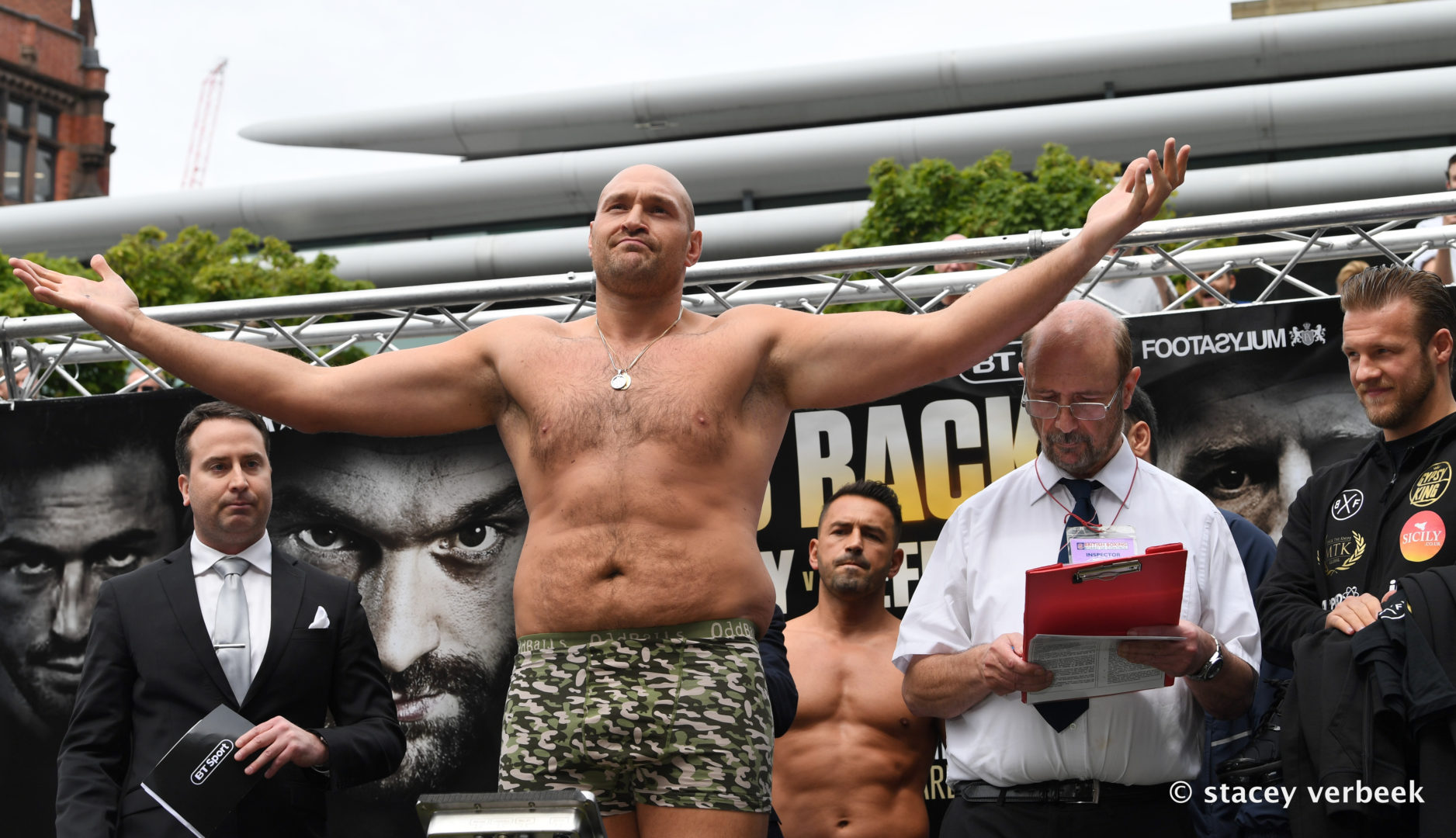By Bart Barry-

Saturday in Los Angeles two heavyweights battled for a significant part of the world championship and surpassed expectations en route to a split-decision draw likely won by Brit Tyson Fury, “The Gypsy King”, over American Deontay “The Bronze Bomber” Wilder. Fury jittered and juked and cuffed and holstered Wilder for all but 25 or 30 seconds of their match, but those seconds were important ones, so important th’t had Fury not landed on his shoulder before his head in round 12 he’d not have afforded sundry pundits a chance to do their misanthropic best while appraising the scorekeepers’ produce.
Boxing won Saturday in the same sense its combatants emerged victorious from their scrum: Both guys to the occasion rose and proved much better than earlier versions of themselves. But these are not great fighters, and while their match was far better than it might have been, to put Fury-Wilder on any fight-of-the-year lists is to consign heavyweights to the soft sizeism of low expectations. Expectations honestly arrived at, albeit.
In his second career championship prizefight Fury was indeed much better than in his first, and if Wilder did not quite finish Fury he at least felled him twice with punches you might in good conscience teach a youngster to throw. As promised the match was often insipid but never unsuspenseful. Both men, too, did their best; they presented great versions of themselves to one another and took honest shots. Neither man awoke Sunday with regrets.
In their ways Tyson and Deontay are evenly matched talents. Were fights still to go till one man got disabled from toeing the line Wilder would win every time, much as Fury’d do were championship prizefights reduced from 12 rounds to 10. Pursuing the feat continually Wilder should expect to knock Fury to the bluemat once every 27 minutes, on average, for the next five years, and Fury should expect to enjoy striking Wilder 60 times flush before his each horizontaling. Conditioning and what pronouncedly variable rates of dissipation affect conditioning being held equal, of course, which it’s safe to imagine they’ll not be; if Wilder looked partially chastened at the closing bell Fury looked elated, vindicated, ready to spend another extended sabbatical traveling and writing.
Whatever the eternally lamenting masses opine of the decision, fact remains in a fight with Tyson Fury, Wilder could win decisively by landing only two punches in any second less than 36 minutes and win controversially by landing just 10 punches in a match settled by official judging. Life is unfair all over but particularly so in prizefighting and magnificently so in heavyweight prizefighting.
If there’s no desire here to play scorekeeper-apologist there’s some desire, indeed, to impart a thought that came along about the time Saturday’s decision did: In a round, such as the first, when combatants land an aggregate of six punches in 180 seconds, a punch every half-minute of threatening the feat, a judge’s position on the mat actually might affect his card honestly. Were you judging three minutes of mutual belligerence you might intuit from what glimpses you caught a general sense of what happened even while being blocked by either of the combatants or the referee or even a camera flash in the background for a few of the decisive moments. But tasked with catching the one punch either man might land every halfminute you might could fail at the sight of a ref’s back obstructing your eyes or the hulking surface area of one of the two giants blocking fully your view of his opponent’s purchasing fist.
Were we more interested in truth than decisiveness we’d petition sanctioners round the world encourage their scorekeepers to mark 10-10 frequently as they mark 10-9, to say, effectively, “I don’t know who won that round so it was even.” What boxing judges I’ve known are decent, average folks empowered disproportionately for a few hours every year. The obviously corrupt ones are not local but imported from jurisdictions renowned for their corruption. If such a person wished to rig his card and withstand subsequent commission scrutiny he might give every early round to his designated man, and in the absence of clean punching cite subjective factors like ring generalship.
Two-point rounds, in this scheme, bring unwanted attention; if gentlemen can agree to disagree about 115-113 tallies, either way, 115-111, to pull an example out of thin air, makes sparkly what probably wishes be occult. (Fortunately for one Las Vegas judge who attempted a similar sort of legerdemain for Pacquiao-Marquez 3, scoring rounds 8-12 geometrically opposite what happened, Pacquiao did not fell Marquez in round 12, for that would’ve made an evidently excusable 116-112 card into an investigatable 117-110.)
But haven’t you written an aficionado should prize knockouts so highly he caren’t a whit who wins a decision, no matter its corruption? Indeed, and that mostly holds, with the conceivable exception of a stylist so negative he mustn’t stutterstep even once along a tightrope spanning 2,160 seconds – for him alone one might justifiably endure the suspense of official scorecards’ unveiling. There’s irony, yes, such a tightroper find himself bequeathed a frame so absurdly imposing as Fury’s. If there’s something aesthetically dissonant about any 200-pound man in flight Fury’s beating a nimble retreat at 6-foot-9 and 257 pounds is ridiculous to the point of beautiful.
In the general range of consciousness prizefighters and aficionados roam nothing worse might be said of a man than others laugh at him. A few bands higher, though, comes this possibility: Causing the world to greet you always with a chuckle and shake of the head, as Tyson Fury does, is a trait wonderful as it is uncommon. Long live the Gypsy King!
Bart Barry can be reached via Twitter @bartbarry








